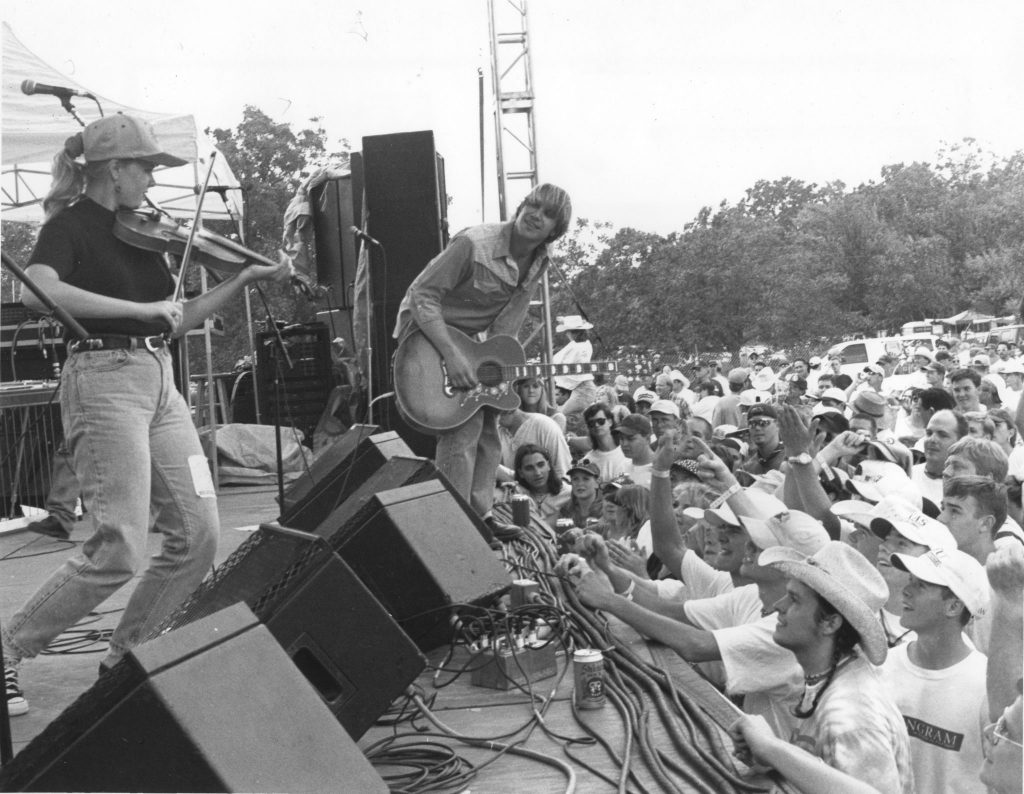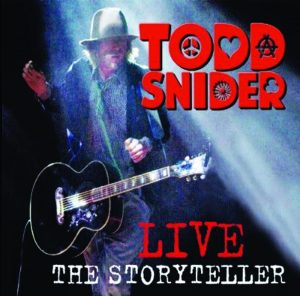By Andrew Dansby
(March/April 2013/vol. 6 – Issue 2)
Todd Snider ends and begins again in 2003. The year between his first live album, Near Truths and Hotel Rooms (Oh Boy!, 2003), and his masterpiece, East Nashville Skyline (Oh Boy!, 2004), is the midway point of Snider’s career (thus far) and the delineation between his early and later work, between his scrappy young voice and his ragged old voice, and the time before and after the Oxycontin addiction that landed him in an ambulance with a crying wife and paramedics banging on his chest. As a young man he was a great smartass and a gifted songwriter who wrote several enduring tunes. With Skyline, Snider became a masterful songwriter — he’s still a pretty good smartass — who writes enough top-shelf tunes to fill entire albums. At 46 Snider is also the best raconteur in the music business, which is why his shows are so popular; they’re part concert and part comedy routine and fully engaging. But perhaps most impressive of all is the fact that he’s still writing his best songs, which isn’t something that could necessarily be said about all of his heroes, some of whom coasted for years on the greatness of their mercurial youth.
There’s no such thing as a Todd Snider Museum, but here’s a story emblematic of Snider about visiting the next best thing. In December 2012 my wife and I were eating pizza in a near empty Italian restaurant in Tillamook, Ore., when a man at the table next to ours apologized for his children’s chattiness. A conversation ensued that, naturally, turned to vocation. “We’re in law enforcement,” the guy said.
That got my attention. “Here in Tillamook?” I asked.
“Yes.”
“So there’s this song about the jail … ” I said, at which point three Tillamook County law enforcement officers interrupted me by singing, “I’m sittin’ here waitin’ in the Tillamook County Jail …”
The three officers weren’t on duty when Snider was arrested about 10 years ago, but by all accounts the Tillamook law found the singer-songwriter to be a charming, likeable guest, and Snider has said he has no hard feelings after he was arrested when a construction worker accused him of shooting him the finger and driving recklessly. A subtle distinction worth pointing out: Snider is the kind of guy who knows the difference between a hard-working officer doing his job and The Man.
 It’s all documented in the Skyline track “Tillamook County Jail,” a fine example of Snider’s art: poignant, funny, carefree (but not entirely carefree), touched with regret, vividly detailed, lightly fictionalized for the sake of a better narrative, and reliably transparent, at least when he’s singing about himself. A Randy Newman enthusiast, he’s also capable of disappearing into an unreliable narrator from time to time. Seemingly aloof, he actually studies his heroes — guys like Jerry Jeff Walker, John Prine, Billy Joe Shaver, and Kris Kristofferson — with the attention of an honor roll student.
It’s all documented in the Skyline track “Tillamook County Jail,” a fine example of Snider’s art: poignant, funny, carefree (but not entirely carefree), touched with regret, vividly detailed, lightly fictionalized for the sake of a better narrative, and reliably transparent, at least when he’s singing about himself. A Randy Newman enthusiast, he’s also capable of disappearing into an unreliable narrator from time to time. Seemingly aloof, he actually studies his heroes — guys like Jerry Jeff Walker, John Prine, Billy Joe Shaver, and Kris Kristofferson — with the attention of an honor roll student.
Then there’s his commitment to the underdog. No songwriter loves losers more: Snider finds humanity in shamed celebrity. He also writes epic the lives of colorful locals who land in the paid obits, the kind of guys who serve as unelected mayors of their particular block or bar. He’s not fond of bullies, whether it’s an abusive boomtown foreman or the president of the United States.
These qualities first coalesced to perfection on East Nashville Skyline, an album that opens with “Age Like Wine,” on which Snider writes wearily and mischievously about his own close call: “Old timer, old timer,” he sings about himself. “Too late to die young now.”

Todd Snider (with Jenni Finlay on fiddle) at LaborFest in Luckenbach in 1996. (Photo by Diana Hendricks)
The song offers notice of where he’d been and where he was going. “My new stuff is nothing like my old stuff was, and neither one is much when compared to the show,” he sings. It’s a telling line because prior to Skyline, the shows were better than the albums. But his ruminations on second chances made for a recording that changed his career. “Play a Train Song” is a vividly detailed tribute to a recently deceased East Nashville character and friend whose personality almost writes the song itself. There’s a brutish affirmation in the seemingly gentle “Sunshine,” a song about a jumper on the ledge that plays as a thinly veiled take on Snider’s own close call, with the cheering crowd and all. He awakes in a hotel room, his body busted but alive. And he comes out of it with five lines that Snider’s heroes likely would have tried to take from him in a card game if he’d been singing in the 1970s:
“I don’t know when it will be
but the next time you see me
I’ll be tapping to a whole new beat
Walking souls into the holes of my shoes
down the sunny side of the street.”
He closes the album with the Guy Lombardo standard “Enjoy Yourself,” which is plucky and wise to time: “Enjoy yourself,” Snider croaks, “it’s later than you think.” Tellingly, his voice sounds different on Skyline. The youthfulness of his early singing was replaced by something weary and worn; Snider had become one of the old guys he’d spent years admiring.
East Nashville Skyline is as biographical as Snider has allowed himself to be on record, and because it documents his survival it’s crucial to understanding his renaissance. It’s an album informed by death and regret, yet threaded with hope. That skyline was sunlit as it marked a new morning for Snider following some hard times. He’d turn his attention outward on subsequent albums. But before we get to those, it seems like as good a time as any to rewind back to the beginning when he was bright-eyed, floppy-haired and ridiculing angst-ridden rockers and admiring grizzled sage-like singers twice his age.
 After choosing his trade and cutting his teeth in San Marcos, Texas, in the 1980s, Snider began releasing albums in the early ’90s. His debut, Songs for the Daily Planet (MCA, 1994) positioned him solidly in the roots/Americana realm right around the time grunge was devolving into perma-grunge. Snider proved deft with humor, mocking cultural plumage (“big bow-headed chicks and frat guys,” “wearing $40 tie-dye t-shirts”) and proclivities (“here’s to hair gel, hanging out at the health spa”) of his peers on “My Generation Part 2.” “Alright Guy” finds Snider applying the unreliable/delusional narrator device that he’d master a few years later; it’s Mellencampy, only funny. The album also contains a still-funny hidden track, “Talkin’ Seattle Grunge Rock Blues.” That song may not mean much to kids today, with grunge nearly 20 years dead, but it remains a smart and gently scornful send-up of the recurring musical trend in which a gaggle of bands baaaa while staring at a bellwether’s backside. Musically, the album has the fewest of Snider’s gentler songs, much of it propelled instead by the late Eddy Shaver’s laser-like guitar.
After choosing his trade and cutting his teeth in San Marcos, Texas, in the 1980s, Snider began releasing albums in the early ’90s. His debut, Songs for the Daily Planet (MCA, 1994) positioned him solidly in the roots/Americana realm right around the time grunge was devolving into perma-grunge. Snider proved deft with humor, mocking cultural plumage (“big bow-headed chicks and frat guys,” “wearing $40 tie-dye t-shirts”) and proclivities (“here’s to hair gel, hanging out at the health spa”) of his peers on “My Generation Part 2.” “Alright Guy” finds Snider applying the unreliable/delusional narrator device that he’d master a few years later; it’s Mellencampy, only funny. The album also contains a still-funny hidden track, “Talkin’ Seattle Grunge Rock Blues.” That song may not mean much to kids today, with grunge nearly 20 years dead, but it remains a smart and gently scornful send-up of the recurring musical trend in which a gaggle of bands baaaa while staring at a bellwether’s backside. Musically, the album has the fewest of Snider’s gentler songs, much of it propelled instead by the late Eddy Shaver’s laser-like guitar.
 Step Right Up (MCA, 1996) is what you’d expect from a follow-up. It’s a mix of roots and rock, with a song (“Prison Walls”) that would end up being the first in an ongoing jail series for Snider. “I Believe You” has a hopefulness that would harden some over the years, though it never completely went away. And “Tension” has stuck around in his live sets. It’s a funny take on our culture and violence, a theme Snider revisits regularly.
Step Right Up (MCA, 1996) is what you’d expect from a follow-up. It’s a mix of roots and rock, with a song (“Prison Walls”) that would end up being the first in an ongoing jail series for Snider. “I Believe You” has a hopefulness that would harden some over the years, though it never completely went away. And “Tension” has stuck around in his live sets. It’s a funny take on our culture and violence, a theme Snider revisits regularly.
 Neither of his first two records turned Snider into a star, which he likely didn’t want to be anyway. But he was being bankrolled by major-label MCA, so it was time for a change. Viva Satellite (MCA, 1998) is not what you’d expect next. It’s an album of stomping garage rock, the oddest album in Snider’s discography, and one with uneven rewards. Though he’s done fine in garage mode over the years, the pace seems to pull Snider’s voice out of its laconic comfort zone. Comparisons to Tom Petty abounded. There are some keepers, but the writing is uneven. Fittingly, he wears an uncomfortable expression on the cover, his hair piled into an almost-pompadour, his shoulders slouchy in a pin-stripe jacket.
Neither of his first two records turned Snider into a star, which he likely didn’t want to be anyway. But he was being bankrolled by major-label MCA, so it was time for a change. Viva Satellite (MCA, 1998) is not what you’d expect next. It’s an album of stomping garage rock, the oddest album in Snider’s discography, and one with uneven rewards. Though he’s done fine in garage mode over the years, the pace seems to pull Snider’s voice out of its laconic comfort zone. Comparisons to Tom Petty abounded. There are some keepers, but the writing is uneven. Fittingly, he wears an uncomfortable expression on the cover, his hair piled into an almost-pompadour, his shoulders slouchy in a pin-stripe jacket.
 The gamble didn’t exactly pay off, and Satellite was Snider’s last record for MCA. But he soon landed at a new label that seemed to fit him better, anyway: Oh Boy!, the label started by his hero and kindred spirit in the delicate art of poignant/funny songwriting, John Prine. With Happy to Be Here (Oh Boy!, 2000) Snider steered back toward singer-songwriter territory. It contains another one of his enduring live songs with “D.B. Cooper,” about the mysterious thief/hijacker who Snider heard about in the news as a kid. It’s not so much a story song as a meditation on freedom as Snider imagines the outlaw somewhere drinking champagne. It’s a 13-song album, which may be a play on it resulting from a 12-step program as documented on “Long Year,” which packs anxiety, humor and sadness (and maybe a gentle dig at Billy Joel) into three consecutive lines:
The gamble didn’t exactly pay off, and Satellite was Snider’s last record for MCA. But he soon landed at a new label that seemed to fit him better, anyway: Oh Boy!, the label started by his hero and kindred spirit in the delicate art of poignant/funny songwriting, John Prine. With Happy to Be Here (Oh Boy!, 2000) Snider steered back toward singer-songwriter territory. It contains another one of his enduring live songs with “D.B. Cooper,” about the mysterious thief/hijacker who Snider heard about in the news as a kid. It’s not so much a story song as a meditation on freedom as Snider imagines the outlaw somewhere drinking champagne. It’s a 13-song album, which may be a play on it resulting from a 12-step program as documented on “Long Year,” which packs anxiety, humor and sadness (and maybe a gentle dig at Billy Joel) into three consecutive lines:
“You know I’ve always been afraid of a 12-step crowd
They laugh too much and talk too loud
Like they all know where everyone should be.”
And then he ends the song by knocking back a shot in a bar. Cycles can be tough to break. He’d sing about it a few years later on “Greencastle Blues.”
 Snider seemed to be nesting in a folkier place, which suited him well, especially when he could, on occasion, break out the louder guitars. New Connection (Oh Boy!, 2002) contains “Vinyl Records,” which features a roll call of his favorite musicians, telling because it doesn’t just include the obvious insurgent country types one would expect, but also blues, soul, pop, rock and other musicians. Most telling, perhaps, is the inclusion of oddball “Country” Joe McDonald. Snider proved previously that he was willing to jab a stick at peer-pressured musical trends framed as the zeitgeist, but by aligning himself with an earnest rabble-rousing ’60s folkie whose cultural weight seemed to disappear as soon as the Vietnam War was over, Snider was essentially defining his own brand of cool, which had nothing to do with any contemporary cultural trends. When hippies reached their peak of scorn among musical hipsters, Snider opened his arms and received their big stinky hug. New Connection also included “Beer Run,” a funny tune that was co-opted by another writer who served his less funny variation to Garth Brooks for a hit song. (Keep this in mind for later.) “Anywhere” is a sweet and simple declaration of commitment to his better half, a song type that would become another Snider sub-genre.
Snider seemed to be nesting in a folkier place, which suited him well, especially when he could, on occasion, break out the louder guitars. New Connection (Oh Boy!, 2002) contains “Vinyl Records,” which features a roll call of his favorite musicians, telling because it doesn’t just include the obvious insurgent country types one would expect, but also blues, soul, pop, rock and other musicians. Most telling, perhaps, is the inclusion of oddball “Country” Joe McDonald. Snider proved previously that he was willing to jab a stick at peer-pressured musical trends framed as the zeitgeist, but by aligning himself with an earnest rabble-rousing ’60s folkie whose cultural weight seemed to disappear as soon as the Vietnam War was over, Snider was essentially defining his own brand of cool, which had nothing to do with any contemporary cultural trends. When hippies reached their peak of scorn among musical hipsters, Snider opened his arms and received their big stinky hug. New Connection also included “Beer Run,” a funny tune that was co-opted by another writer who served his less funny variation to Garth Brooks for a hit song. (Keep this in mind for later.) “Anywhere” is a sweet and simple declaration of commitment to his better half, a song type that would become another Snider sub-genre.
 “Beer Run” also appeared on Near Truths and Hotel Rooms (2003), Snider’s first live album and his first top-to-bottom classic. The song followed his now standard introduction: “If you’ve never heard me play before my name is Todd Snider. I’ve been driving around 15 years making this shit up, singing it for anybody who will listen to it … I want to let you know that I also might share some of my opinions with you over the course of the evening. I’m not gonna share them with you because I think they’re smart or because I think you need to know ’em. I’m gonna share them because they rhyme. I didn’t come down here to change any of y’all’s minds about anything. I came down here to ease my own mind about everything.” The album finds Snider accompanied only by his own acoustic guitar, but he’d become a commanding live presence. It was also made around the time of Snider’s Oxy troubles. His voice sounds strained, but he’s a masterful host, perhaps best exemplified by the fact that “The Story of the Ballad of the Devil’s Backbone Tavern” is just as wondrously engaging as the actual song “The Ballad of the Devil’s Backbone Tavern.”
“Beer Run” also appeared on Near Truths and Hotel Rooms (2003), Snider’s first live album and his first top-to-bottom classic. The song followed his now standard introduction: “If you’ve never heard me play before my name is Todd Snider. I’ve been driving around 15 years making this shit up, singing it for anybody who will listen to it … I want to let you know that I also might share some of my opinions with you over the course of the evening. I’m not gonna share them with you because I think they’re smart or because I think you need to know ’em. I’m gonna share them because they rhyme. I didn’t come down here to change any of y’all’s minds about anything. I came down here to ease my own mind about everything.” The album finds Snider accompanied only by his own acoustic guitar, but he’d become a commanding live presence. It was also made around the time of Snider’s Oxy troubles. His voice sounds strained, but he’s a masterful host, perhaps best exemplified by the fact that “The Story of the Ballad of the Devil’s Backbone Tavern” is just as wondrously engaging as the actual song “The Ballad of the Devil’s Backbone Tavern.”
 From this album forward, Snider seemed to know exactly who he was. He even sang about it on his next album, East Nashville Skyline, where he proudly aligned himself with like-minded “tree huggin’, peace lovin’, pot smokin’, barefootin’ folk-singin’ hippies like me.” Near Truths proved a far superior summation of his first decade as a recording artist than That Was Me, a 2005 compilation his former label cobbled together.
From this album forward, Snider seemed to know exactly who he was. He even sang about it on his next album, East Nashville Skyline, where he proudly aligned himself with like-minded “tree huggin’, peace lovin’, pot smokin’, barefootin’ folk-singin’ hippies like me.” Near Truths proved a far superior summation of his first decade as a recording artist than That Was Me, a 2005 compilation his former label cobbled together.
Having gotten death and near death out of his system with Skyline, Snider looked out and didn’t care for what he saw during the lead up to the Great Recession.
 Skyline’s slow shuffle gave way to a rootsy garage rock vibe on The Devil You Know (IMS/New Door, 2006), which is populated by proud failures and struggling types who can’t get a break. Opener “If Tomorrow Never Comes” — a Garth Brooks song title repurposed as a touché — storms out of the gate and targets the exclusivity of religion. His boomtown worker sneeringly challenges his boss in “Looking for a Job,” and Snider doesn’t name names of the guilty in “You Got Away With It (A Tale of Two Fraternity Brothers),” but he leaves plenty of clues. The title track is a fiery run through the projects, social commentary he’d tried in his younger days without the same deft hand. “There’s a war going on that the poor can’t win,” he howls. “Helicopters over the house again.” “Thin Wild Mercury,” despite the title, isn’t specifically about Bob Dylan, but rather a committed folkie left in Dylan’s dust when Dylan changed and the folkie didn’t: “Poor Phil Ochs, sad and low/hands in his pockets, wonderin’ where to go,” he sings. “All That Matters” is another lovely song for the wife that pilfers a bit of music from Buck Owens. And Country Joe got a birthday name check in “Happy New Year.” Despite its comic tone, “Happy New Year” bookends the album with another song about faith and religion. “Believing and knowing, those are two different things,” he sings.
Skyline’s slow shuffle gave way to a rootsy garage rock vibe on The Devil You Know (IMS/New Door, 2006), which is populated by proud failures and struggling types who can’t get a break. Opener “If Tomorrow Never Comes” — a Garth Brooks song title repurposed as a touché — storms out of the gate and targets the exclusivity of religion. His boomtown worker sneeringly challenges his boss in “Looking for a Job,” and Snider doesn’t name names of the guilty in “You Got Away With It (A Tale of Two Fraternity Brothers),” but he leaves plenty of clues. The title track is a fiery run through the projects, social commentary he’d tried in his younger days without the same deft hand. “There’s a war going on that the poor can’t win,” he howls. “Helicopters over the house again.” “Thin Wild Mercury,” despite the title, isn’t specifically about Bob Dylan, but rather a committed folkie left in Dylan’s dust when Dylan changed and the folkie didn’t: “Poor Phil Ochs, sad and low/hands in his pockets, wonderin’ where to go,” he sings. “All That Matters” is another lovely song for the wife that pilfers a bit of music from Buck Owens. And Country Joe got a birthday name check in “Happy New Year.” Despite its comic tone, “Happy New Year” bookends the album with another song about faith and religion. “Believing and knowing, those are two different things,” he sings.
 Peace Love & Anarchy (Rarities, B-Sides and Demos, Vol. 1) (Oh Boy!, 2007) is what you’d expect from an odds and ends set. “I Feel Like I’m Falling in Love,” a co-write with friend Jack Ingram, is a rough demo, but it’s also hooky as hell. “Old Friend” is equally fetching and more polished. And speaking of old friends, he pays tribute to the San Marcos club where he first started playing on the sloppy rave up, “Cheatham Street Warehouse.”
Peace Love & Anarchy (Rarities, B-Sides and Demos, Vol. 1) (Oh Boy!, 2007) is what you’d expect from an odds and ends set. “I Feel Like I’m Falling in Love,” a co-write with friend Jack Ingram, is a rough demo, but it’s also hooky as hell. “Old Friend” is equally fetching and more polished. And speaking of old friends, he pays tribute to the San Marcos club where he first started playing on the sloppy rave up, “Cheatham Street Warehouse.”  The collection was followed by Peace Queer (Aimless, 2008), a long EP or short album that felt like Snider’s final commentary on the Bush presidency (complete with a song called “Mission Accomplished”).
The collection was followed by Peace Queer (Aimless, 2008), a long EP or short album that felt like Snider’s final commentary on the Bush presidency (complete with a song called “Mission Accomplished”).
 Next was The Excitement Plan (2009), its title lifted from a phrase used by Snider’s con-man father. The Don Was-produced album was infused with a cautious optimism, certainly compared to its two predecessors. That said, there’s a Skyline flashback in “Greencastle Blues,” where Snider again finds himself in the back seat of a patrol car. “How do you know,” he asks, “when it’s too late to learn?” before offering up a Randy Newman-esque spoken-word bit: “You know the number one symptom of heart disease is sudden death?” But he also finds some fun; “America’s Favorite Pastime” recasts the tale of Dock Ellis, the Pittsburgh Pirates player who claimed to throw his 1970 no-hitter on LSD. Harmless chaos, unlikely triumph: these are elements of a Todd Snider song.
Next was The Excitement Plan (2009), its title lifted from a phrase used by Snider’s con-man father. The Don Was-produced album was infused with a cautious optimism, certainly compared to its two predecessors. That said, there’s a Skyline flashback in “Greencastle Blues,” where Snider again finds himself in the back seat of a patrol car. “How do you know,” he asks, “when it’s too late to learn?” before offering up a Randy Newman-esque spoken-word bit: “You know the number one symptom of heart disease is sudden death?” But he also finds some fun; “America’s Favorite Pastime” recasts the tale of Dock Ellis, the Pittsburgh Pirates player who claimed to throw his 1970 no-hitter on LSD. Harmless chaos, unlikely triumph: these are elements of a Todd Snider song.
 After The Excitement Plan Snider made some noise about not making albums anymore, but he didn’t make good on that promise. He released Live: The Storyteller (Aimless 2011), an essential companion piece to Near Truths. This time out he made a double — though you wouldn’t know it from the track listing, which numbers the songs 1 to 24 instead of breaking them into two sets of two — which meant more songs, obviously, and also longer stories between the songs. He’s backed by a full band before a bigger and louder crowd that reflected a new connection between the songwriter and a sustainable listenership who bought into his peace, love and anarchy philosophy. And Snider’s act — so simple but brilliant on the previous live album — expands without losing its charm. His is a comedian’s conciseness dressed in raggedy clothes; of course he’s a Mitch Hedberg fan. It’s also worth noting that his “18 minutes” speech that appeared on Near Truths and in all of his shows has evolved with a darker postscript. “If everything goes particularly well this evening we can all expect a 90-minute distraction from our impending doom.”
After The Excitement Plan Snider made some noise about not making albums anymore, but he didn’t make good on that promise. He released Live: The Storyteller (Aimless 2011), an essential companion piece to Near Truths. This time out he made a double — though you wouldn’t know it from the track listing, which numbers the songs 1 to 24 instead of breaking them into two sets of two — which meant more songs, obviously, and also longer stories between the songs. He’s backed by a full band before a bigger and louder crowd that reflected a new connection between the songwriter and a sustainable listenership who bought into his peace, love and anarchy philosophy. And Snider’s act — so simple but brilliant on the previous live album — expands without losing its charm. His is a comedian’s conciseness dressed in raggedy clothes; of course he’s a Mitch Hedberg fan. It’s also worth noting that his “18 minutes” speech that appeared on Near Truths and in all of his shows has evolved with a darker postscript. “If everything goes particularly well this evening we can all expect a 90-minute distraction from our impending doom.”
 Doom averted, at least for now, Snider released two albums last year. Time as We Know It: The Songs of Jerry Jeff Walker (Aimless, 2012) is a fairly self-explanatory recording. Snider cites the gonzo singer and songwriter as the single most important reason he wanted to make songs for a living. He gets spirited backing from the band Great American Taxi, and while Time isn’t a revelation as a Snider album, it does do a great service by directing attention to Walker’s gifts as a songwriter. Too often he’s dismissed as just the author of “Mr. Bojangles” and the voice that made money for Guy Clark.
Doom averted, at least for now, Snider released two albums last year. Time as We Know It: The Songs of Jerry Jeff Walker (Aimless, 2012) is a fairly self-explanatory recording. Snider cites the gonzo singer and songwriter as the single most important reason he wanted to make songs for a living. He gets spirited backing from the band Great American Taxi, and while Time isn’t a revelation as a Snider album, it does do a great service by directing attention to Walker’s gifts as a songwriter. Too often he’s dismissed as just the author of “Mr. Bojangles” and the voice that made money for Guy Clark.
 Snider’s other album from 2012, released first, was the real keeper, though. If East Nashville Skyline is Snider’s most cohesive set of internalized songs, Agnostic Hymns & Stoner Fables (Aimless, 2012) is his outward looking work of perfection. With Jason Isbell on guitar and Amanda Shires on shadow vocals and fiddle, the sound is perfectly tailored to the songs, rough but precise. It’s the finest distillation thus far of the garage folk Snider had been working toward for years. Here he finds a way to grumble and whisper, with sympathetic backing that captures the complexity of the songs. And several of them continue his pursuit to call out bull-shitters and con men. “Synthetic collateralized debt obligation” doesn’t exactly sing on its own, but Snider finds the tragedy and anger in the Abacus Fund, as well as the irony that a word that implies rudimentary numbers and childhood could be used for the sort of corrupted business practices that caused the great financial fallout. “Good things happen to bad people,” he sings. Not that the album is all grousing about bullies. “Brenda” is one of his great love songs, albeit a decidedly non-traditional one, about two guys who started the Rolling Stones. But “Too Soon to Tell” sizzles with anger. Admittedly, he first makes no apologies for wanting to get bent from time to time: “Everything in moderation, including moderation I suppose.” And he growls about what happens when we’re all gone, a spiritual bent about evening the score in the afterlife: “It’s too soon to tell what’s gonna happen when you die/It’s too soon to tell what we’ll ever avenge/They say that living well is the best revenge,” he sings, but he’s not buying it. “I say bullshit, the best revenge is to win/This isn’t over, we’re going to meet again.”
Snider’s other album from 2012, released first, was the real keeper, though. If East Nashville Skyline is Snider’s most cohesive set of internalized songs, Agnostic Hymns & Stoner Fables (Aimless, 2012) is his outward looking work of perfection. With Jason Isbell on guitar and Amanda Shires on shadow vocals and fiddle, the sound is perfectly tailored to the songs, rough but precise. It’s the finest distillation thus far of the garage folk Snider had been working toward for years. Here he finds a way to grumble and whisper, with sympathetic backing that captures the complexity of the songs. And several of them continue his pursuit to call out bull-shitters and con men. “Synthetic collateralized debt obligation” doesn’t exactly sing on its own, but Snider finds the tragedy and anger in the Abacus Fund, as well as the irony that a word that implies rudimentary numbers and childhood could be used for the sort of corrupted business practices that caused the great financial fallout. “Good things happen to bad people,” he sings. Not that the album is all grousing about bullies. “Brenda” is one of his great love songs, albeit a decidedly non-traditional one, about two guys who started the Rolling Stones. But “Too Soon to Tell” sizzles with anger. Admittedly, he first makes no apologies for wanting to get bent from time to time: “Everything in moderation, including moderation I suppose.” And he growls about what happens when we’re all gone, a spiritual bent about evening the score in the afterlife: “It’s too soon to tell what’s gonna happen when you die/It’s too soon to tell what we’ll ever avenge/They say that living well is the best revenge,” he sings, but he’s not buying it. “I say bullshit, the best revenge is to win/This isn’t over, we’re going to meet again.”
So is Snider the angry guy following the recession? Or is he the grateful guy with calloused feet on the sunny side of the street from “Sunshine”? More likely he’s both than neither. After a trying first 10 years as a recording artist — when Snider was handed boot after shoe after boot, often resulting in blisters — he finally seemed to settle into his skin as the careful and carefree barefoot outcast he was meant to be. He’s an old-timer with a hardened worldview tempered by a child-like sense of wonder. He hasn’t taken the easiest route to where he is. But like the best songwriters, he’s turned his mishaps into songs. Likely great things rest ahead as he starts to write his third decade of them.
MR. RECORD MAN’S TOP 5 TODD SNIDER ALBUMS
1) Agnostic Hymns & Stoner Fables (Aimless, 2012)
 To say the bottom dropped out of the American economy is a bit misleading in that it implies passivity. Greed and entitlement caused the problem and those are qualities associated with bullies. Snider’s not keen on bullies. This album includes some of his most pointed songs and the best instrumental backing he’s ever had. “New York Banker” is fittingly ferocious. It’s not a sustained rant, though, with “Brenda” and a few other tracks offering some tenderness.
To say the bottom dropped out of the American economy is a bit misleading in that it implies passivity. Greed and entitlement caused the problem and those are qualities associated with bullies. Snider’s not keen on bullies. This album includes some of his most pointed songs and the best instrumental backing he’s ever had. “New York Banker” is fittingly ferocious. It’s not a sustained rant, though, with “Brenda” and a few other tracks offering some tenderness.
2) East Nashville Skyline (Oh Boy!, 2004)
 Raw and personal yet redemptive, Snider barrels through a tunnel of death and addiction and recovery with a smoky tribute to a friend (“Play a Train Song”), a Fred Eaglesmith cover about young dead musicians (“Alcohol and Pills”), an anthem that explains him and much of his following (“Conservative Christian, Right-wing Republican, Straight White American Males”) and a pair of closers with weathered optimism.
Raw and personal yet redemptive, Snider barrels through a tunnel of death and addiction and recovery with a smoky tribute to a friend (“Play a Train Song”), a Fred Eaglesmith cover about young dead musicians (“Alcohol and Pills”), an anthem that explains him and much of his following (“Conservative Christian, Right-wing Republican, Straight White American Males”) and a pair of closers with weathered optimism.
3) Live: The Storyteller (Aimless, 2011)
 The better of his two live albums finds him backed by a tight band and running through more songs and longer stories. The “Mushroom Story” is a particular treasure. The best way to take in Snider is in person. This double-album does an admirable job of capturing the essence of his shows with a healthy dose of his two best studio albums to that point.
The better of his two live albums finds him backed by a tight band and running through more songs and longer stories. The “Mushroom Story” is a particular treasure. The best way to take in Snider is in person. This double-album does an admirable job of capturing the essence of his shows with a healthy dose of his two best studio albums to that point.
4) The Devil You Know (IMS/New Door, 2006)
 After looking inward for East Nashville Skyline, Snider looked outward and didn’t care much for what he saw. He opens by razzing a hard-ass boomtown boss, slyly takes a swipe at the then-president for his college days and paints a portrait of urban America that could use some relief.
After looking inward for East Nashville Skyline, Snider looked outward and didn’t care much for what he saw. He opens by razzing a hard-ass boomtown boss, slyly takes a swipe at the then-president for his college days and paints a portrait of urban America that could use some relief.
5) Near Truths and Hotel Rooms (Oh Boy!, 2003)
 The best representation of Snider’s first 10 years of recording. Just voice and guitar, stories and songs. It’s charming, funny and written with that it-only-looks-easy conversational precision of Roger Miller and John Prine, two other songwriters who get the humor/poignancy balance right.
The best representation of Snider’s first 10 years of recording. Just voice and guitar, stories and songs. It’s charming, funny and written with that it-only-looks-easy conversational precision of Roger Miller and John Prine, two other songwriters who get the humor/poignancy balance right.






No Comment